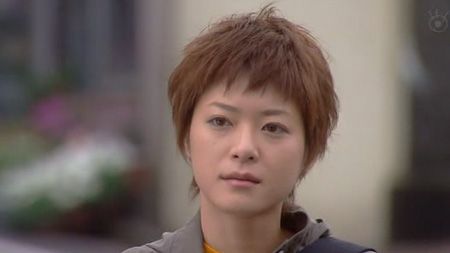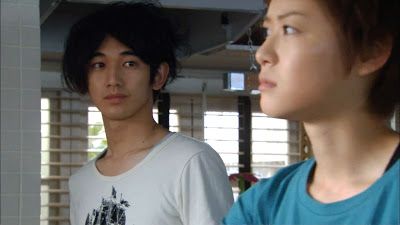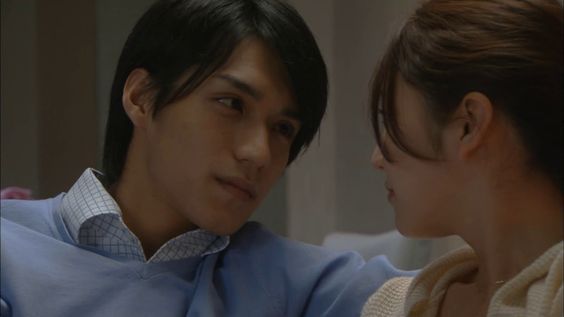[Japanese drama experience] Last Friends: Get along in the most suitable way for each other
(There is a thunderbolt in the text! There is a thunderbolt in the text! There is a thunderbolt in the text! It is very important, so I will say it three times!)

I think 10 years ago, the plot setting of this Japanese drama was quite avant-garde? Although the Japanese seem to be very good at expressing these concepts through drama, even if the world does not accept them, they are real and must be recognized.
In the play, 5 male and female characters share a suite together, some of them are lesbians who have been in love with female roommates for a long time, some are domestically abused by their cohabiting boyfriends, some boys are sexually assaulted by unrelated sisters, which leads to fear of women, and two of them are having extramarital affairs with each other. relationship (this is quite challenging the moral bottom line).

The part of the lesbian (played by Ueno Shuri), although she suffered a lot of strange eyes because of her gender identity, and her heart was also very painful, but she worked hard to do psychological counseling. She also worked very hard to prove that although she is a girl, she can do many things that the world thinks only boys can do (motorcycle competition). She also worked very hard to silently protect the girl she had a crush on, and the whole process made people feel very distressed and admired.
Now society is relatively more accepting of gay film and television works, but it seems that there are more stories about gay men, and less mention of lesbians. In fact, lesbians live very hard in this patriarchal society. Even if they feel that they are boys, they are regarded as boys. For weak women, there is a higher chance of encountering sexual harassment by heterosexual men than gay men. I don’t like boys anymore, I’m not satisfied with my female physical characteristics, and I have to be harassed by the opposite sex and joke about sexual characteristics. How do you know that you don't like the opposite sex?"
Fortunately, after consultation and encouragement from friends, the lesbian in the play was finally able to face the fact that her biological sex and gender identity were different. Although her family was shocked, they also supported her. Among them, the father of a lesbian is really touching. From when his daughter hated wearing skirts when she was a child, to when she grew up, she seemed to be engaged in motorcycle racing, which is dominated by men. , but knowing that her daughter's gender identity and sexuality are backwards, she also wishes her daughter to live the way she wants.
Although he blessed his daughter, the father's heart was not relieved immediately. He sat alone in the park and cried, "She is still my cutest daughter..." Although we often say "your child is not your child," he himself When raising an adult child, it is inevitable to have some expectations for her. When such expectations cannot be realized, it is normal for parents to have an impact on their hearts. Traditionally, when many parents encounter this kind of thing, they will take out their anger on the child for the first time, but this father chose to bear it by himself and sincerely hopes that the child will be happy, which is really touching!
When it comes to the cohabitation part of extramarital affairs that challenges the moral bottom line, the indecisive man (played by Yamazaki Kifan) actually went back to find his original partner several times. It is also very irresponsible for the feelings of the partner of the extramarital affair. Fortunately, he finally came to his senses and could no longer live up to both sides. He finally broke off the relationship with the Yuan partner and decided to stay with the woman. Although extramarital affairs challenge the bottom line of morality, maybe this is also a kind of emotional exercise! People who are not suitable will never end, and people who are suitable will eventually come together.

As for Ying Tai's role as a very gentle boy in the play, he is very attentive and takes care of everyone, but every time a girl shows his favor, he resists it. When he sees a sex scene in a movie, he is still very apprehensive, so I Originally thought he played gay, after all, there are lesbian roles.
As a result, he finally confessed to a lesbian, maybe he is not gay, he likes girls, or he likes girls who are less like traditional women. Because he was sexually assaulted by a sister who had no blood relationship and his parents remarried when he was a child, he was afraid of having physical contact with girls. The play conveys the concept that acquaintances are sexually assaulted and boys are also sexually assaulted, so he heard Lesbians shared their stories of being sexually harassed by their seniors, and responded with a heartfelt response, "regardless of gender, people should be measured in their dealings with others." very important thing.

In addition to the above-mentioned stories of gender issues and extramarital affairs, in fact, this drama mainly revolves around a heroine (Maami Nagasawa) who is domestically abused by her cohabiting boyfriend (Ryo Nishikido).
Some people look like people on the outside, take off their masks and become demons in front of people they are close to. In the play, the heroine's cohabiting boyfriend is a social worker in charge of child-related welfare outside. He seems to be enthusiastic and kind, but at home he is a scumbag who can control and abuse his girlfriend.
Hateful people also have pitiful things, that is, the cohabitation boyfriend was abandoned by his parents when he was a child, and when he grew up, he wanted to help children like him, but because of his growth background, he also developed an extreme personality with strong possessiveness, and he was afraid that his girlfriend would leave him. .
The domestic abuser is the only one who goes further and further in this drama, from the domestic violence girlfriend to the friends who ran to harass and beat the girlfriend who provided shelter.
In the play, he is the only one who has never been able to solve his own problems, or from another perspective, he chooses to end his life to solve the problem. Maybe he realizes that his destiny is destined to be a devil and can never go back.

Because her cohabiting boyfriend couldn't bear to become like a demon and committed suicide, the heroine was really able to get rid of the scumbag, only to find out that she was pregnant. Although this child has half the blood of a scumbag, it is the heroine who gives birth and takes care of the child. This child is a gift from God and has nothing to do with the scumbag who left everything behind.
In the end, a lesbian who likes the heroine, a gentle boy who was originally afraid of a woman but fell in love with her after being melted by a lesbian, and a heroine who is single again, there is no relationship between husband and wife or lovers, but they choose to live together and take care of each other , because in each other's hearts, each other is the most important existence.
Loving someone does not necessarily mean getting along with the other person and getting along with each other in the most comfortable way is the best outcome.
My IG account: @haru.and.g1.day (full of star chasing things)
Like my work? Don't forget to support and clap, let me know that you are with me on the road of creation. Keep this enthusiasm together!

- Author
- More